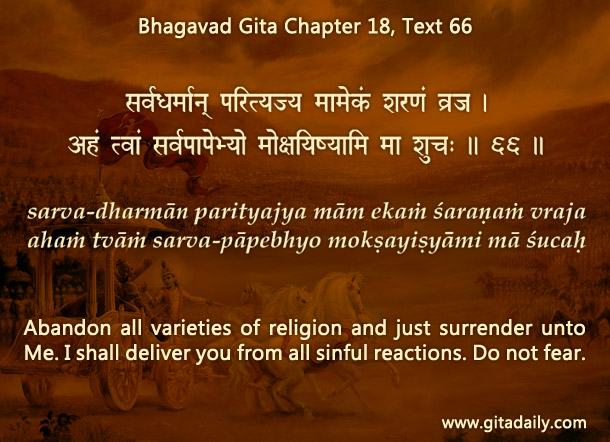
“As I am a devotee, even if I sin, it doesn’t matter because Krishna will free me from all sins.” Some people argue thus while justifying their wrongdoings.
This kind of reasoning, known as antinomianism, is a distortion of Gita wisdom. The concerned Bhagavad-gita verse (18.66) states that Krishna frees from sinful reactions those who surrender to him. The previous Gita verse (18.65) outlines how to surrender – by offering our mind, heart and life to Krishna. Implicit is the understanding that such a surrendered life is free from sin. And the Gita states this explicitly earlier (07.28): only those free from sin can practice steady bhakti.
Then, what is Gita (18.66) about?
About the countering of past sins, not condoning of present sins.
It assures firstly that we don’t need to be sin-free to start bhakti. And, secondly, we don’t need to some other atonement to counter our past sins. Bhakti itself is the best atonement, for it frees us from not just sinful reactions, but also sinful desires. It gives us experiences of higher devotional happiness, thereby inducing spiritual desires and crowding material desires out of our heart.
If we misuse this generosity of bhakti as a license to continue sinning, that means we continue to not only entertain but also indulge in sinful desires. Such desires will prevent our devotional desires from stabilizing and will deprive us of steady higher taste, thereby impeding our spiritual progress.
Of course, overcoming our past sinful conditionings frequently requires sustained struggle, and Krishna mercifully sees beyond our lapses (09.30, 09.31 )to our spiritual potential. But antinomianism takes away our impetus to struggle, thereby suppressing our spiritual potential. Surrender to Krishna means absorbing ourselves in his remembrance internally and his service externally, thus going beyond sin to a life of pure ecstatic love.
Explanation of article:


Hare Krishna ,
Nice article and also the video explain by you Hari Bol.
Hare Krishna Prabhuji,
Excellent article. Thank you.
Krishna is so kind that he is ready to wash away all our sins, and prevent us to go to hell, just by whole-hearted and dedicated surrender to him..what a great redeemer for the entire mankind. Also he says, there’s nothing needs to be done for atonement for our sins. thats the golden opportunity to the entire mankind. hare krishna. jai shri krishna.One who misinterprets this and acts over smart is sure to go to hell to be taken charge by lord yama.
This is most hope giving shloka of Bhagvad-Gita.Herein Lord Krishna Himself assures us that I will burn reactions of all previous sinful activities.Now our duty is to follow this instruction under proper guidance and not to think in a antinomianism way,which will take us to the helish life.Thanks for nice article on verse 18.66.